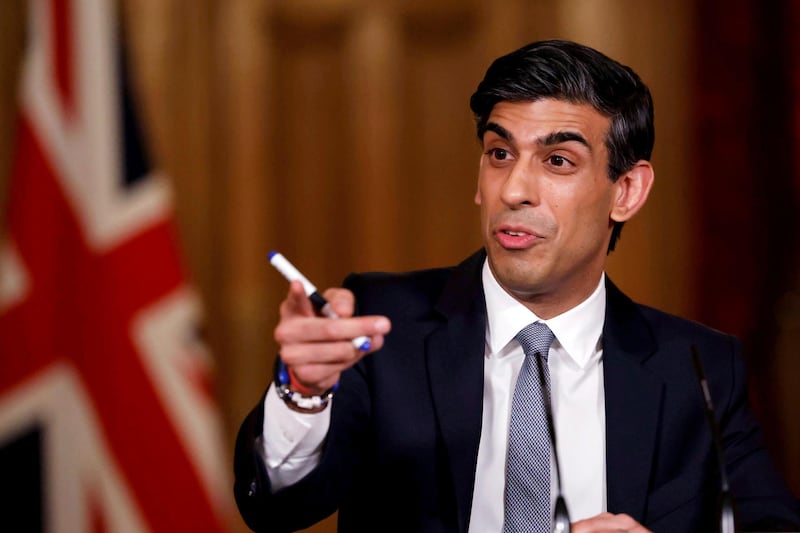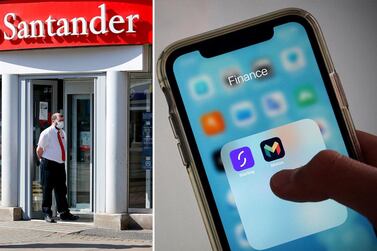British Finance Minister Rishi Sunak told the Bank of England on Monday to examine the case for a new "Britcoin", or central bank-backed digital currency, aimed at tackling some of the challenges posed by cryptocurrencies such as Bitcoin.
A BoE-backed digital version of sterling would potentially allow businesses and consumers to hold accounts directly with the bank and to sidestep others when making payments, upending the lenders' role in the financial system.
"We're launching a new taskforce between the Treasury and the Bank of England to coordinate exploratory work on a potential central bank digital currency [CBDC]," Mr Sunak told a financial industry conference.
Soon after, Mr Sunak tweeted the single word "Britcoin" in reply to the finance ministry's announcement of the taskforce.
Britcoin? #UKFW21 https://t.co/Slk5lwUvrV
— Rishi Sunak (@RishiSunak) April 19, 2021
Other central banks are also looking at whether to set up digital versions of their own currencies, essentially widening access to central bank funds that only commercial banks can use at present. This could speed up domestic and foreign payments and reduce financial stability risks.
China is a front-runner to launch a CBDC. Last week, the European Central Bank said it was studying an electronic form of cash to complement banknotes and coins but any launch was still several years away.
The BoE said a digital version of sterling would not replace either physical cash or existing bank accounts.
"The government and the Bank of England have not yet made a decision on whether to introduce a CBDC in the UK, and will engage widely with stakeholders on the benefits, risks and practicalities of doing so," the BoE said.
BoE governor Andrew Bailey has previously said Bitcoin, the best known cryptocurrency, fails to act as a stable store of value or an efficient way to make transactions, making it ill-suited to serve as a currency and a risky bet for investors.
Central banks also took a dim view of efforts by Facebook to set up its own digital currency.
Even so, cryptocurrencies have received growing interest from mainstream financial institutions, and Bitcoin hit a record high of nearly $65,000 on April 14, up ten-fold in the space of a year. Since then, Bitcoin has slumped and is currently trading at $55,105.35 as of 9.35am UAE time.
Susannah Streeter, senior investment and markets analyst at Hargreaves Lansdown, said until now, the British government and the BoE have maintained a "hands-off approach" towards digital currencies.
"This doesn’t mark a rapid dive into setting up a rival to Bitcoin, far from it. As cryptocurrency investors ride a wave of speculation, the government will be keen to distance itself from what is still seen as the Wild West of the payments world," Ms Streeter said.
"However, officials clearly believe they can’t ignore the surge of interest in digital currencies, as a means of faster and more efficient money transfers, particularly internationally."
Ms Streeter said the move also keeps central banks relevant and prevents digital currencies backed by big tech becoming dominant in the future, especially given the drift towards cashless societies.
"Unlike cryptocurrencies, a BoE-backed CBDC would, by its very nature, be centralised," she said.
"This new breed of digital sterling would sit alongside cash and current electronic payments, and could improve the efficiency and cost of retail sales and large value transactions."
Mr Sunak, launching the UK FinTech Week conference, announced other measures aimed at maintaining the post-Brexit competitiveness of London, which vies with New York to be the world's largest financial centre.
Since Britain's departure from the European Union's orbit on December 31, the financial sector has faced restrictions on serving EU customers.
Mr Sunak proposed removing restrictions inherited from the EU, including on who can trade shares in London and the double volume cap.
This would help Britain attract more "dark" or anonymous trading by big investors after Amsterdam toppled London as Europe's top share trading centre in January.
"The consultation process aims to deliver a rulebook that is fair, outcomes-based and supports competitiveness, while ensuring the UK maintains the highest regulatory standards," Mr Sunak said.
Britain would also propose changes to companies' share prospectuses to ensure the rules are "not overly burdensome", he said.








